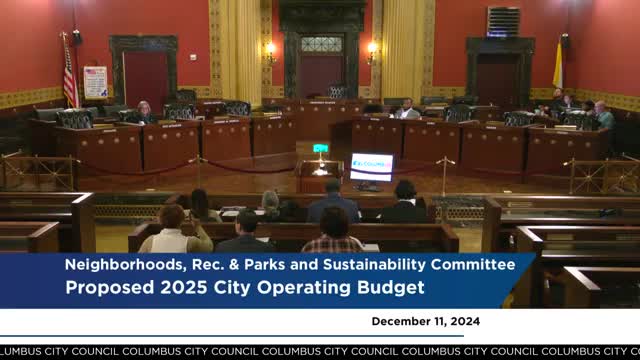Neighborhoods department seeks $15.2 million for 2025; 311 improvements and youth funding highlighted
Get AI-powered insights, summaries, and transcripts
Subscribe
Summary
Department of Neighborhoods proposed a $15,224,064 2025 operating budget that includes a $1.7 million increase for summer youth employment, planned upgrades to the CBUS 311 system, continued Mobile City Hall outreach and the near-final Eastland plan.
The City of Columbus Department of Neighborhoods presented a $15,224,064 operating budget proposal on the committee's 2025 budget hearing, including a $1,700,000 increase earmarked for summer youth employment programs.
Director Kim Douglas, who led the presentation, said the department will continue work on front-line services and outreach. “The 311 Customer Service Center is on track to set a new record with over 520,000 customer contacts in 2024,” Douglas said, and described planned customer-facing improvements including hiring temporary staff to process bulk-trash requests and launching a website feature allowing residents to search requests by service number.
The budget covers 68 full‑time and two part‑time positions, Douglas said, and the $1.7 million increase is accounted for in summer youth program funding. The department also described expanded language services: “Spanish, French, Nepali, Somali and Arabic have been identified as the most frequently accessed languages,” Douglas said, noting a 20% increase in interpretation requests from 2023.
Why it matters: Neighborhoods’ programs are the city’s community-facing services — from 311 case intake to neighborhood liaisons and area-commission training — and the department said the proposed budget would preserve and expand those touchpoints.
Details and supporting items
Douglas reviewed several ongoing initiatives the budget would support. Mobile City Hall made appearances at more than 74 community events in 2024, she said, and the department managed 43 summer youth program contracts totaling $4,800,000 in 2024. The proposed budget adds $1,700,000 to that summer youth total.
Douglas also described neighborhood liaison work and a new contract with the Center for Community Solutions that, since August, removed 1,100 cubic yards of waste and debris from about 4,500 linear feet of sidewalks, streets and alleys. Area commission training expanded in 2024 to 12 sessions covering zoning, meeting management and now planned fiscal training for area commission budgeting allocations.
On planning, Douglas said the Eastland plan — developed with consultant MKSK and feedback from more than 1,600 people across three public meetings, five workshops and 10 focus groups — is nearly complete and expected to be released in February 2025. She described catalytic sites identified in the roadmap, including the former Kroger site that the administration expects will host the Mid‑Ohio Food Collective and allow city offices and area commissions to have convening space.
Deputy Director Todd Dieffenerfer provided additional operational notes about Pride Centers, saying the Far East Pride Center is expected to relocate to a property associated with the Mid‑Ohio Food Collective site and the West Side Pride Center will move into renovated Fire Station 10 on Broad Street. Dieffenerfer said the new space will allow 311 representatives to be present for community meetings and create room for three additional 311 team members at the West Side location.
Questions from council members focused on implementation of 311 improvements and how the department will communicate seasonal resources. Councilmember Weich asked whether 311 can provide up‑to‑date lists of warming centers; Douglas said 311 maintains an internal knowledge base and can refer callers to the appropriate front door for social services but that the office is discussing how to improve automated, publicly available information.
Next steps and timeline
Douglas closed by describing recruitment for the 2025 New American Leadership Academy (NALA): she said the department received 53 applications for 2025 representing 27 nationalities and cultural groups. The Eastland plan release is expected in February 2025 and the department said it will continue to work with council during the review and amendment phases of the mayor’s proposed budget.
